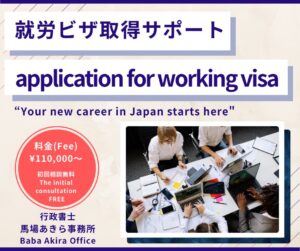Part 1: What Is a Dependent Visa in Japan? — Understanding the Basic Framework and Requirements
When a foreign national residing in Japan wishes to bring their spouse or children from overseas, the primary visa category involved is the Dependent Visa.
In this article, we will explain the essentials of Japan’s Dependent Visa system from an administrative scrivener’s (Gyoseishoshi) perspective in a way that’s easy to understand for first-time applicants.
What Is a Dependent Visa?
A Dependent Visa (Kazoku Taizai) is a type of residence status that allows family members who are financially supported by a foreign resident in Japan to live with them.
The eligible family members are limited to:
- Spouses (must be legally married)
- Children (including biological and adopted children)
Parents or siblings are not eligible for a Dependent Visa under current immigration regulations.
What Does “Being Supported” Mean?
The core premise of the Dependent Visa is that the applicant is being financially supported by the primary resident in Japan.
For example, the following cases are considered to meet the “dependence” requirement:
- The spouse does not work and lives off the income of the primary resident.
- A child is attending school in Japan and has no income.
- The family’s living expenses are covered by the sponsoring resident’s salary or assets.
If these conditions are not met, the immigration bureau may reject the application.
Who Can Sponsor a Dependent Visa?
Only foreign residents holding certain long-term visa types in Japan can sponsor family members under a Dependent Visa. These include:
- Engineer / Specialist in Humanities / International Services
- Business Manager
- Intra-Company Transferee
- Researcher, Instructor, Medical Services, etc.
In contrast, Technical Intern Trainees and many holders of Specified Skilled Worker visas are generally not allowed to bring dependents (with limited exceptions).
Length of Stay and Permitted Activities
The length of stay granted under a Dependent Visa usually matches that of the sponsoring resident and is typically:
- 6 months, 1 year, 3 years, or 5 years
Also note that dependent visa holders are not allowed to work by default. However, they may apply for a “Permission to Engage in Activity Other Than That Permitted” (資格外活動許可) to work part-time, up to 28 hours per week.
Why the Immigration Bureau Reviews These Applications Carefully
Despite being seen as a “simple family visa,” Dependent Visa applications are subject to careful scrutiny. This is due to risks such as:
- Fake marriages or fraudulent family claims
- Lack of sufficient income to support the family
- Risk of unauthorized employment
Therefore, applicants must provide:
- Proof of the family relationship (e.g., marriage certificate, birth certificate, with translations)
- Proof of the sponsor’s ability to support the family (e.g., tax certificate, employment letter, rental contract)
Conclusion: Understanding the Principles Is the First Step
The Dependent Visa is more than just a formality. It is a clearly defined status under Japan’s Immigration Control Act, with strict requirements that must be met.
When applying, it is crucial to demonstrate both the family relationship and financial ability to provide support.
In the next article, we will explain the actual application process and required documents, based on real case experiences and insights from our practice as immigration specialists.

